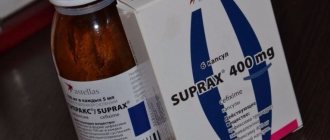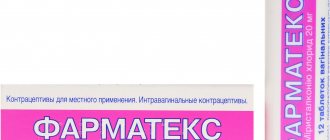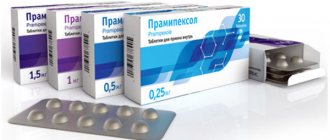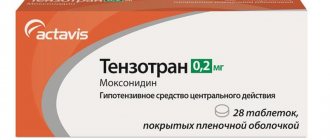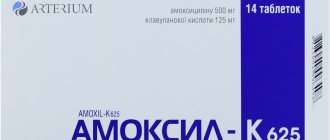Allapinin tablets belong to the first class of the group of antiarrhythmic drugs. The drug is able to block sodium channels in the membranes of cardiomyocytes. It provokes a slowdown in intraventricular and atrioventricular conduction, shortens the functional and effective refractory periods in the atria, His bundle, AV node and Purkinje fibers. The drug has absolutely no effect on the duration of the QT interval or the frequency of contractions.
In the initial absence of manifestations of cardiac dysfunction, the drug "Allapinin" (the instructions for use contain such information) does not affect myocardial contractility. Does not affect the conductivity of the atrioventricular node in the anterograde direction. The drug does not have a negative hypotensive effect. In practice, its inotropic effect is not observed. When taking the medicine, automatism in the sinus node is not inhibited. It has an antispasmodic, local anesthetic, and anticholinergic effect to a moderate degree that has no clinical significance. It has minor coronary dilation and sedative properties. The effect of oral administration is noted after forty or sixty minutes. Maximum activity reaches after 80 minutes. The duration of therapeutic action is from 8 hours.
Pharmacodynamics and pharmacokinetics
Pharmacodynamics
As Wikipedia indicates, lappaconitine hydrobromide belongs to class I-C antiarrhythmic drugs . Blocks the operation of fast sodium channels in the membranes of myocardial cells. Causes inhibition of AV conduction and intraventricular conduction, reduces refractory intervals of the His bundle, atria, AV node and Purkinje fibers, does not change the duration of the QT segment, antegrade conduction velocity through the AV node, heart rate, blood pressure and the ability of the myocardium to contract (with initial absence of symptoms of heart failure).
The drug does not inhibit the ability of the sinus node to automate. Does not cause a negative inotropic effect and has no hypotensive effect.
The drug Allapinin has a coronary dilator, antispasmodic, local anesthetic, anticholinergic and sedative effect. When taken orally, the effect develops after 45-55 minutes, reaches its greatest strength after 75 minutes and lasts about 8 hours.
Pharmacokinetics
Bioavailability approaches 40%. Able to penetrate the blood-brain barrier. The half-life is 70 minutes. The drug is evacuated by the kidneys.
With long-term use, the half-life may increase.
In case of chronic renal failure, the half-life increases by 3 times, and in case of hepatic cirrhosis - up to 10 times.
When is a dose adjustment required?
Sometimes it becomes necessary to change the regimen for taking Allapinin. The instructions and reviews from specialists contain information that reducing the amount of the drug or increasing the interval between doses may be recommended for first-degree atrioventricular block, intraventricular conduction disorders, and bradycardia. Caution is observed in case of angle-closure glaucoma, severe (peripheral) circulatory disorders, hypertrophy in prostate tissue. Correction of the circuit is necessary due to changes in electrolyte metabolism, conductivity in Purkinje fibers, blockade in one of the legs in the His bundle. Caution is also necessary when taking other antirhythmic drugs simultaneously with the drug "Allapinin". Reviews from many experts are very categorical on the issue of changing the dosage if there is no effect.
Indications for use
- attacks flutter and fibrillation ;
- ventricular extrasystole;
- supraventricular extrasystole;
- paroxysmal tachycardia of the supraventricular type;
- paroxysmal tachycardia of the ventricular type (if there are no organic heart diseases).
Alcohol compatibility
It is prohibited to use the product together with any alcoholic beverages. Bradycardia, tachycardia, acute heart failure, orthostatic hypotension may develop. To avoid negative consequences, you should abstain from alcohol during therapy. Drinking alcohol is relatively safe 15-30 days after completing treatment.
Contraindications
- AV block (without the presence of an artificial pacemaker).
- Sinoatrial block.
- Simultaneous blockade of the right part of the His bundle and one of the branches of the left part.
- Cardiogenic shock.
- Severe forms of arterial hypotension.
- Severe hypertrophy of the muscle tissue of the left ventricle (wall thickness over 1.4 cm).
- Chronic heart failure of moderate to severe degree, functional class 3-4 according to the New York classification.
- Severe liver or kidney dysfunction.
- Post-infarction cardiosclerosis.
- Fructose intolerance , deficiency of the enzyme sucrase/isomaltase glucose/galactose malabsorption syndrome .
- Age less than 18 years.
- Allergy to the drug.
The medicine is prescribed with caution for intraventricular conduction disorders, 1st degree AV block weakness of the sinus node , severe diseases of the peripheral circulation, bradycardia , prostate hypertrophy , electrolyte metabolism disorders, angle-closure glaucoma , deterioration of conduction along Purkinje fibers, blockade of one of the parts of the His bundle , with when taken together with other antiarrhythmic drugs.
When is medication not prescribed?
Contraindications include cardiogenic shock, atrioventricular block in the third and second degree (in the absence of an artificial heart pacemaker). It is not allowed to take the medicine for severe arterial hypertension (with systolic pressure less than 90 mm/Hg), severe hypertrophy in the left ventricular myocardium. The medication is prohibited for post-infarction cardiosclerosis. The drug is not recommended for blockade in the right branch of the His bundle (when combined with disorders in the branch on the left side), chronic failure of cardiac function of moderate and severe course. The medicine is contraindicated for people under 18 years of age (due to the fact that the safety and effectiveness of the drug have not been established), fructose intolerance. Persons with galactose/glucose malabsorption syndrome, pregnancy, or isomaltase/sucrose deficiency should not take the medication. The drug is not recommended for hypersensitivity to the components. If therapy is necessary for a nursing patient, lactation must be stopped.
Side effects
Side effects of Allapinin:
- From the side of nervous activity, headache , ataxia , dizziness , a feeling of heaviness in the head, and diplopia .
- From the circulatory system, disorders of AV conduction and intraventricular conduction, the development of sinus tachycardia , the appearance of arrhythmogenic effects , changes in the ECG (increase in the PQ segment, expansion of the QRS segment) are possible.
- allergic reactions is possible .
Allapinin's analogues
There are other effective drugs with similar effects:
- Allaforte. Contains the same active substance. Valid for 12 hours. Does not contain sugar. Side effects occur less frequently and are less pronounced. It has a high cost.
- Propanorm. The active substance is propafenone. Does not penetrate the blood-brain barrier. Contraindicated in myocardial infarction. Has a lower cost.
- Rhythmonorm. Contains propafenone. Quickly distributed throughout body tissues. May cause side effects in various organ systems. In case of overdose, coma may occur.
- Ethacizin. The active substance is diethylaminopropionylethoxycarbonylaminophenothiazine. An analogue of allapinin, the effect of which begins 1-2 days after application.
Instructions for use on Allapinin (Method and dosage)
The drug is taken orally, after meals, with a small volume of warm water, without chewing.
Allapinin, instructions for use
The drug is prescribed to be taken 25 mg three times a day (at equal intervals of time). If there is no therapeutic effect, then Allapinin is taken four times a day (at equal intervals of time).
It is allowed to increase the dosage to 50 mg up to 4 times a day (at equal intervals of time). The maximum daily dose is 300 mg.
The duration of therapy and the question of changing the dosage regimen are decided by the attending physician.
What effective drug exists with a similar mechanism of action?
The drug "Allarhythmin" contains the same active substance as the drug "Allapinin" - lappaconitine hydrobromide. The medication belongs to class I antiarrhythmic drugs. The drug "Allarhythmin" is available in tablet form and as a solution for injection into a muscle or vein. When taken orally, the effect of the medication occurs in about an hour. After 4-5 hours, the effectiveness reaches its maximum. Duration of action – 8 hours or more. When administered into a vein, the effect of the medicine occurs faster - after 15-20 minutes. Unlike the drug "Allapinin", the drug "Allarhythmin" is recommended to be taken 3 times a day, 25 mg. The medicine should be taken before meals. It is advisable to crush the tablets. In case of lack of effectiveness, an increase in dosage and frequency of administration is allowed. Intravenous administration is carried out slowly, over 5 minutes. The dosage is set according to the patient's weight. Recommended dose is 0.3-0.4 mg/kg. In some cases (especially severe), the medicine is re-administered after 6 hours. 0.4 mg/kg is prescribed into the muscle with an interval of 6 hours. It should be noted that intravenous administration is not recommended at home. The drug "Allarhythmin" has the same restrictions on use as the drug "Allapinin". Treatment is carried out in a hospital setting under constant medical supervision and ECG monitoring. This is especially important in the treatment of patients with first degree atrioventricular block and chronic decompensated heart failure.
Overdose
Signs of overdose
The drug has a narrow breadth of therapeutic action, so severe intoxication can easily develop (often with simultaneous use of other antiarrhythmic drugs sinoatrial block, bradycardia, asystole, AV are also possible - blockade, attacks of ventricular polymorphic tachycardia , marked decrease in blood pressure, headache, weakened myocardial contractility, blurred vision, dizziness, digestive disorders.
Treatment of overdose
Treatment is symptomatic. For the treatment of developed ventricular tachycardia, it is prohibited to use antiarrhythmic drugs of classes I-A and I-C . Sodium bicarbonate is able to stop the widening of the QRS segment, bradycardia and lowering blood pressure.
During pregnancy
The drug Allapinin is strictly contraindicated during pregnancy and lactation, especially in the first trimester. The medicine is prescribed only in cases of extreme necessity, when the benefits of therapy outweigh the potential harm to the mother and child. Constant medical supervision is required. It is recommended to stop breastfeeding during treatment.
- Pumpkin pies: baking recipes
- Third month of pregnancy
- How to pickle garlic arrows for the winter
special instructions
In patients with a myocardial infarction or with cardiac failure, as well as in persons with an installed pacemaker, the threshold for its stimulation may increase.
Before starting the drug, electrolyte imbalances must be eliminated; during treatment, regular monitoring of electrolyte balance is necessary.
sinus tachycardia develops during long-term use of the drug, the use of small doses of beta-blockers .
If dizziness, headache, or diplopia it is recommended to reduce the dosage of the drug.
When treating with the drug, you must be careful when driving.
additional information
Before starting therapy, disorders in the water-electrolyte balance are eliminated; while taking the medication, it is necessary to ensure constant and careful monitoring of it. The cardiac pacing threshold may be increased in people who have had a heart attack (acute), have heart failure, or have a pacemaker. In case of dizziness, diplopia, or headaches, it is recommended to reduce the dosage. If sinus tachycardia occurs due to prolonged use of medication, beta-blockers are prescribed if necessary. These drugs are recommended in low doses. On the basis of therapy, caution must be exercised when engaging in potentially dangerous activities that require increased attention and rapid concentration or reaction.
Allapinin price, where to buy
The price of Allapinin No. 30 is 510-540 rubles.
- Online pharmacies in RussiaRussia
ZdravCity
- Allapinin tablets 25 mg 30 pcs. CJSC "Pharmcenter VILAR"
550 rub. order
Pharmacokinetic characteristics
The bioavailability of the drug is 40%, it has a “first pass” effect through the liver and penetrates the blood-brain barrier. One of the three main metabolites has a blood pressure lowering effect. Half-life (T1/2) of Allapinin
), as described in the instructions, ranges from 1 to 1.2 hours. The medicine is excreted by the kidneys. An extension of the half-life is observed with long-term use of the drug Allapinin if the patient has renal failure (T1/2 increases by 2-3 times), liver cirrhosis (T1/2 increases by 3-10 times).



